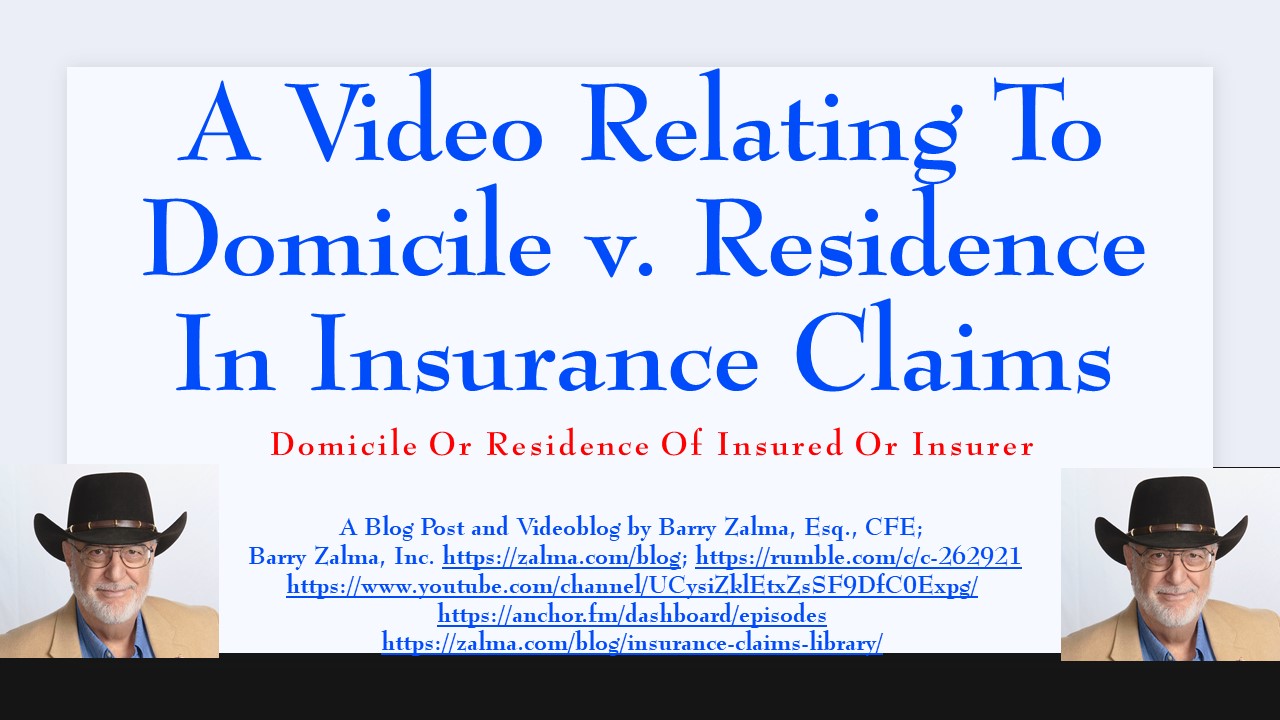Premium Only Content

A Video Relating to Domicile v. Residence in Insurance Claims
Domicile or Residence of Insured or Insurer
Insurance companies often see disputes relating to the terms “domicile” and “residence.” It is important, therefore, that everyone in the business of insurance must understand the meaning, and application, of the terms to insurance claims and how they relate to individuals and corporations that are insured or insurers.
Definition of Domicile
Although a person may have more than one residence, he or she may only have one domicile at any one time. [Nat'l Artists Mgmt. Co. v. Weaving, 769 F. Supp. 1224, 1227 (S.D.N.Y. 1991)]. Domicile is established initially at birth and is presumed to continue in the same place, absent sufficient evidence of a change. To effect a change of domicile, two things are indispensable: First, residence in a new domicile; and, second, the intention to remain there.
If a person is domiciled in a particular location, that location remains his domicile whenever he is absent so long as he has the intention of returning. In determining domicile courts consider factors including voting registration, employment, current residence, location of real and personal property, location of spouse and family, driver's license, automobile registration, tax payment and addresses, and location of a person's bank account and physician.
Residency does not necessarily equate to domicile (which is the definition of citizenship for diversity-jurisdiction purposes). [Grandinetti v. Uber Techs., Inc., No. 19 C 05731, 2020 WL 4437806, at *4 (N.D. Ill. Aug. 1, 2020).]
Domicile is usually determined by determining:
the state where the policy was formed and issued;
the residence and domicile of the parties to the accident;
the residence and domicile of the parties to the insurance contract;
the state where each vehicle was principally garaged or registered;
the state where treatment for resulting injuries was delivered; and
the reasons why each party and vehicle were in the state where the accident occurred. [Garces-Rodriguez v. GEICO Indem. Co., 16-196 (La. App. 5 Cir. 12/21/16), 209 So. 3d 389, 394 (collecting cases involving collisions in Louisiana and observing that Louisiana courts "have often found that the state where the insurance policy was issued had a more substantial interest in applying its laws than the state where the accident occurred")].
The role of the domicile of a corporate insured should be a dominant fact when dealing with the appropriate interpretation of an insurance contract. According to Illinois law, a corporation is always domiciled in its state of incorporation. [Martin v. Cent. Trust Co. of Ill., 159 N.E. 312, 317 (Ill. 1927)].
Whenever a court is asked to determine a person or corporation’s domicile determination is generally considered a question of fact. However, where the underlying material facts are not in dispute, the determination of domicile is a question of law for the trial court.
Michigan courts have defined “domicile” to mean the place where a person has his true, fixed, permanent home, and principal establishment, and to which, whenever he is absent, he has the intention of returning. A person may have only one domicile, but more than one residence.
Michigan courts, as do most states, apply a multi-factor test in which no one factor is determinative to determine domicile. The Michigan Supreme Court articulated four factors to be considered when determining a person's domicile:
the subjective or declared intent of the person of remaining, either permanently or for an indefinite or unlimited length of time, in the place he contends is his "domicile" or "household";
the formality or informality of the relationship between the person and the members of the household;
whether the place where the person lives is in the same house, within the same curtilage or upon the same premises;
the existence of another place of lodging by the person alleging "residence" or "domicile" in the household.
The New York Appellate Divisions have, similarly, repeatedly recognized that where the insured risk is scattered throughout multiple states, New York courts deem the risk to be located principally in one state, namely, in the state of the insured's domicile at the time the policy was issued, and thus have held that the state of the insured's domicile should be regarded as a proxy for the principal location of the insured risk. [Certain Underwriters at Lloyd's v. Foster Wheeler Corp., 36 A.D.3d 17, 822 N.Y.S.2d 30, 35, 36 (1st Dep't 2006).] New York courts have noted that the state of the insured's domicile is a fact known to the parties at the time of contracting, and application of the law of that state is most likely to conform to their expectations. [Fireman's Fund Ins. Co. v. Great Am. Ins. Co. of N.Y., 822 F.3d 620 (2nd Cir. 2016)]
-
 7:40
7:40
Barry Zalma, Inc. on Insurance Law
1 year agoLoss of Inventory by Bankruptcy
184 -
 15:00
15:00
Barry Zalma, Inc. on Insurance Law
4 years agoA Video Explaining The Need For Training Professional Insurance Claims Personnel
72 -
 16:42
16:42
Barry Zalma, Inc. on Insurance Law
4 years agoA Video Explaining Casualty Insurance
78 -
 32:44
32:44
Twins Pod
4 years agoFactcheckers Claims Georgia Video Evidence Shows Legal Ballot Counting
92.4K420 -
 17:47
17:47
Barry Zalma, Inc. on Insurance Law
4 years agoA Video About a Conviction for Insurance Fraud
91 -
 3:00
3:00
KSHB
5 years agoUnemployment Insurance Claims Skyrocketing
43 -
 0:44
0:44
BANG Showbiz EN
4 years agoCardi B claims music video for WAP cost $1 million
26 -
 15:24
15:24
Barry Zalma, Inc. on Insurance Law
4 years agoA Video Explaining the Claims Made CGL
57 -
 17:00
17:00
Barry Zalma, Inc. on Insurance Law
4 years agoA Video Explaining the Three Major Responses to Insurance Fraud
126 -
 17:29
17:29
Barry Zalma, Inc. on Insurance Law
4 years agoA Video Explaining the Nature of Insurance Underwriting
36